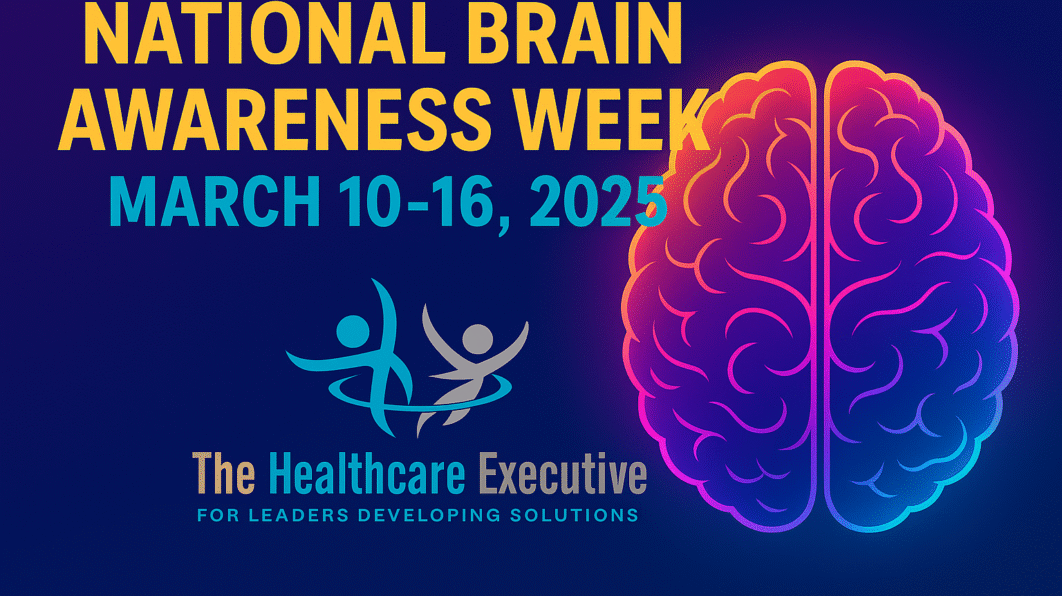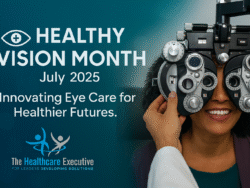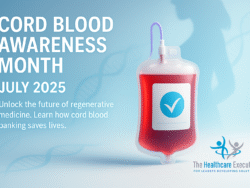National Brain Awareness Week 2025: Elevating Cognitive Health in U.S. Hospitals

- Posted by Greg Wahlstrom, MBA, HCM
- Posted in Health Observance Calendar
Hospital Executives Can Lead the Charge on Brain Health Equity, Workforce Neurodiversity, and Research Engagement
Published: March 10, 2025
National Brain Awareness Week, observed from March 10–16, 2025, highlights the essential role of brain health in individual and societal well-being. Hospital executives have a unique opportunity to lead system-wide efforts focused on cognitive wellness, neurological equity, and brain-focused preventive care. Research from the Dana Foundation underscores the rising prevalence of neurological disorders and the disproportionate impact on marginalized communities. Forward-thinking institutions like Mount Sinai Health System are building interdisciplinary neurological centers that prioritize early detection, cognitive screening, and integrative therapy. These initiatives provide a framework for health systems to reduce disparities in brain care access. Executive leadership should ensure cognitive health is embedded in community benefit planning, wellness initiatives, and employee health programs. In 2025, leaders must elevate brain wellness as a strategic pillar of both care delivery and population health.
The importance of neurodiversity inclusion in healthcare workplaces has become increasingly apparent. Employees with conditions such as ADHD, autism spectrum disorder, or traumatic brain injury bring valuable perspectives that are often overlooked in traditional workforce design. During National Brain Awareness Week, hospital leaders should assess their own hiring practices, workplace accommodations, and leadership training around cognitive inclusion. Organizations like Neurodiversity in Healthcare advocate for broader integration of neurodivergent professionals in healthcare leadership pipelines. Some hospitals, such as Mass General, have partnered with research institutions to promote inclusive mentorship and cognitive bias training. C-suite executives must push their institutions beyond compliance, ensuring equity and belonging for neurodivergent individuals at every level. By championing neurodiversity, leaders unlock untapped innovation, resilience, and care quality potential across teams.
Brain health innovation also presents a frontier for value-based care transformation. Technologies such as digital cognitive assessments, neurofeedback therapy, and remote monitoring tools are advancing rapidly, creating opportunities for executive teams to pilot brain-focused initiatives that improve patient outcomes and reduce hospitalizations. Hospitals like Cedars-Sinai have integrated AI-powered diagnostics in their neurology departments, facilitating earlier detection of cognitive decline. Executives must consider investment in these tools not as niche add-ons, but as foundational supports for whole-person care. Additionally, partnerships with academic research centers can help position hospitals as leaders in neurology, mental health, and community education. During this observance week, healthcare leaders should organize brain health forums, employee education events, and community screenings. The strategic message is clear: brain health belongs at the core of institutional mission and executive accountability.
National Brain Awareness Week also reminds executives to include brain health equity in their social responsibility metrics. Individuals in underserved regions are often diagnosed later with conditions like Alzheimer’s, epilepsy, and Parkinson’s due to access gaps and stigma. According to the National Institute of Neurological Disorders and Stroke (NINDS), racial and ethnic minorities experience disproportionately worse outcomes in neurological care. Hospitals must partner with community organizations to expand culturally responsive brain health education and screening access. Examples like UChicago Medicine demonstrate how health systems can create equity task forces focused on neurological and cognitive care. Executives who embrace these frameworks will not only strengthen their public health impact but also fulfill ESG and community benefit goals. Leaders must treat brain health as a justice issue—not just a clinical one.
Hospital executives should use National Brain Awareness Week 2025 as a launchpad to institutionalize brain wellness within leadership agendas. From neurodiversity inclusion to tech innovation and equity-driven outreach, cognitive health spans every corner of healthcare strategy. It affects medical outcomes, workforce dynamics, operational performance, and system trust. Visionary CEOs will recognize that advancing brain health is not just a specialty service—it is a system imperative. By embedding these values into operational dashboards and governance policies, health systems can lead a new era of brain-forward care. When executive leadership champions cognitive health, the entire healthcare ecosystem—from boardroom to bedside—benefits.
Discover More on Executive Mental Health and Inclusion
Explore how your leadership team can build resilient, brain-aware work cultures that promote cognitive health and inclusive excellence.
Internal Links
- Promoting Mental Health Awareness in Healthcare Settings: Initiatives for 2024
- Mental Health Initiatives: C-suite Leadership in Addressing a Growing Crisis
- Advancing Interdisciplinary Collaboration in Healthcare: Key Strategies for 2024
- Modernizing Patient Education: Innovative Approaches for 2024
- The Rise of Patient Advocacy: Strategies for C-suite Engagement and Response



